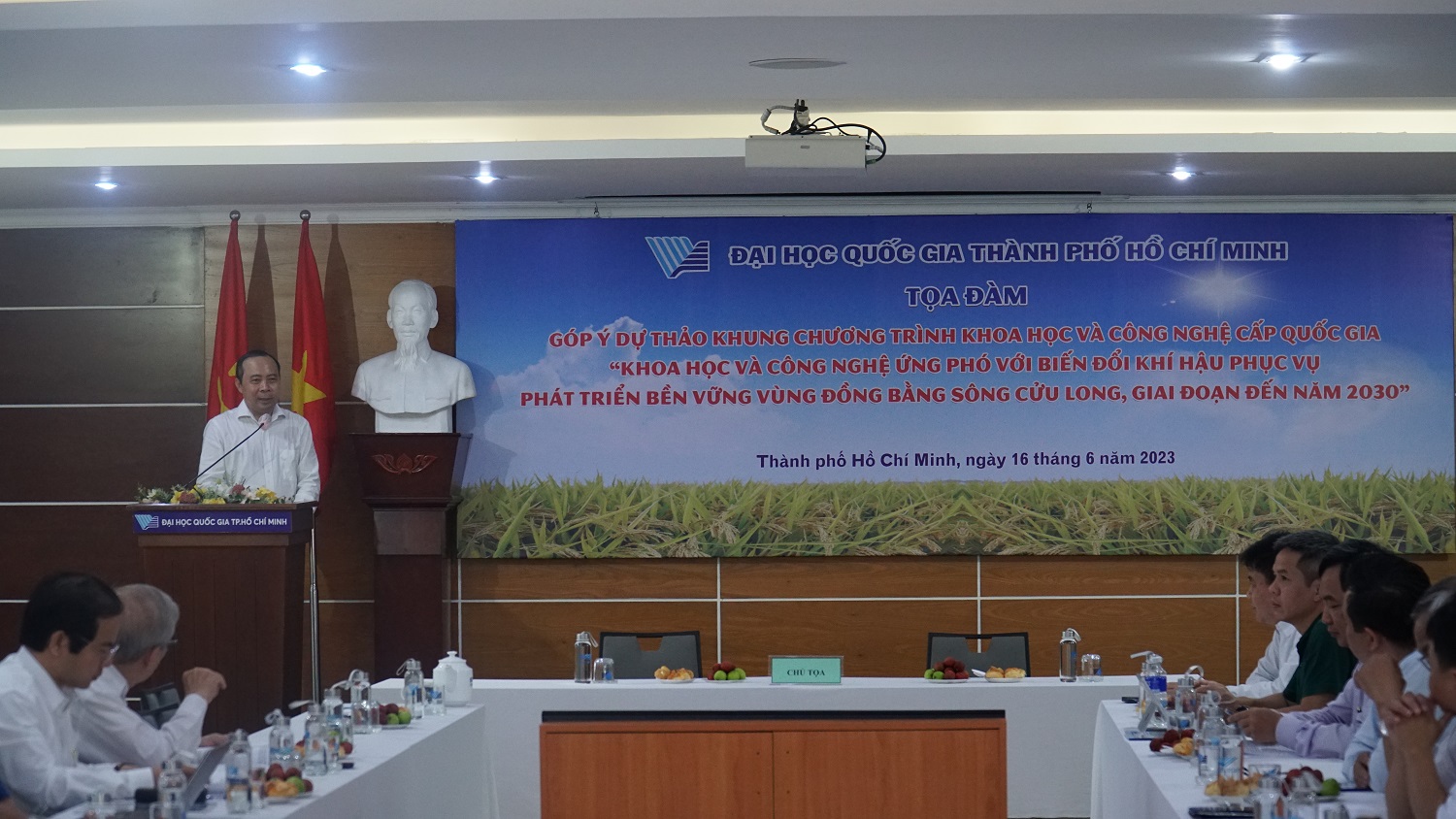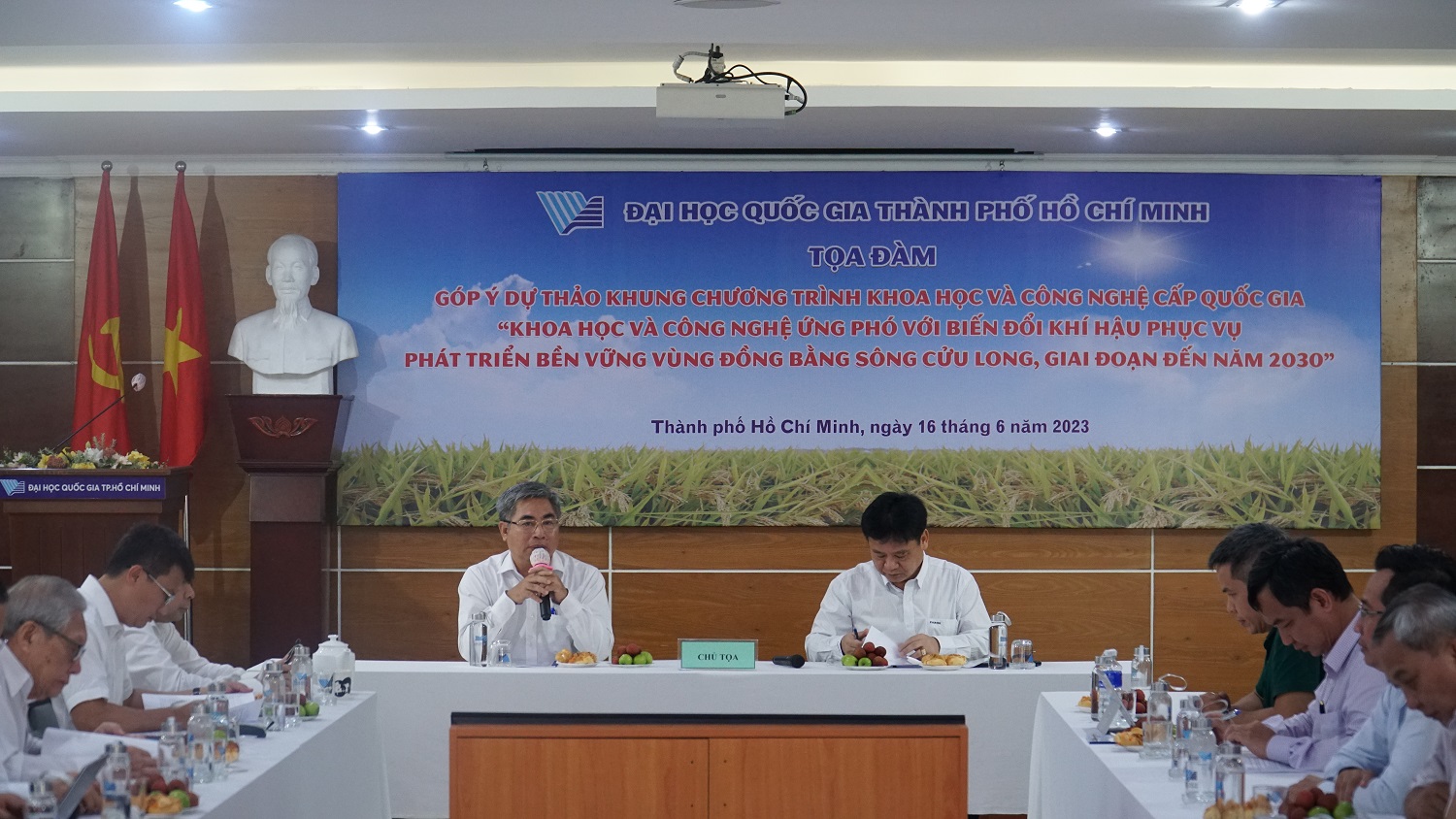Sustainable Development of the Mekong Delta
Date:
- 16/
- 6/
- 2023
Location:
- VNUHCM Administration Building
On the morning of June 16th, at the VNUHCM Administration Building, a seminar to provide feedback for the draft framework of the national program “Science and technology to respond to climate change for sustainable development in the Mekong Delta, period by 2030” took place. Mr. Le Quang Thanh – Head of Department of Social and Natural Sciences, Ministry of Science and Technology, was in attendance.

Associate Professor, Dr. Vu Hai Quan – Chancellor of VNUHCM in the seminar.
The discussion also featured the presence of Associate Professor Dr. Vu Hai Quan, Chancellor of VNUHCM and co-director of the program, Associate Professor Dr. Phan Thanh Binh, former Chancellor of VNUHCM, representatives from member and affiliated units of VNUHCM, leaders of Ministry of Science and Technology, Ministry of Agriculture and Rural Development, leading experts, and scientists among others.
This national science and technology program aims to provide scientific evidence, models, and solutions for sustainable socio-economic development adapting to climate change, while also encouraging the application of science and technology and establishing it as a primary driver of socio-economic development and environmental protection. Above all, the goal is to effectively implement science and technology solutions to develop the Mekong Delta into a key economic region of the country, integrating regionally and internationally in a new context.
The draft framework includes 7 main items.
(1) Research the scientific and practical basis to improve policy mechanisms and economic tools to minimize the impact of climate change on livelihoods, living conditions, and gender equality, thereby promoting activities to respond to climate change and foster sustainable socio-economic development in the Mekong Delta.
(2) Develop and improve methods and processes for predicting the impact of climate change and exploiting and using water upstream of the Mekong River; Apply and transfer advanced technology models and solutions to limit and reduce losses, damage and injuries caused by climate change for sustainable development of the Mekong Delta.
(3) Developing and transferring technology for management, reasonable use of resources and environmental protection; Models, solutions, and tools for monitoring resources and the environment to effectively respond to climate change and sustainably develop regions and sub-regions in the Mekong Delta.
(4) Building models and solutions for socio-economic development, solutions for implementing green economic models, low carbon economy, circular economy, digital economy, sustainable development of the Mekong Delta.
(5) Applying Fourth Industrial Revolution and implementing interdisciplinary science and technology solutions to promote digital economy and digital technology.
(6) Developing and transferring technology to serve agricultural production focusing on three main areas: fisheries – fruit trees – rice associated with ecological subregions, processing industry, green industry, renewable energy, hospitality and tourism; models for economic restructuring, and integrated solutions for sustainable economic and social development in the Mekong Delta region.
(7) Research models, solutions and propose management policies, train and develop human resources to serve sustainable development of the Mekong Delta in the new context.
Speaking at the seminar, Associate Professor, Dr. Vu Hai Quan – Director of VNU-HCM, emphasized that the element of international cooperation has not been mentioned in the draft framework. He said that currently, Vietnam National University-HCM is having 2 international cooperation research projects. The first is to cooperate with Seoul National University (Korea) to help National University-HCM update and innovate its agricultural training program. The second is the Young Southeast Asia Leaders Initiative – Mekong Leadership Program (YSEALI-MLP) project funded by the United States Agency for International Development (USAID).
“On one hand, we have the funding to conduct research projects; on the other, we have the resources for nurturing and training individuals. These two elements go hand in hand; without people, there can be no science and technology, and without science and technology, we cannot develop individuals and products,” remarked the Director of VNU-HCM on the need to synergize resources through international cooperation.

Mr. Le Quang Thanh – Chief of the Social and Natural Sciences Department, Ministry of Science and Technology (on the right), and Associate Professor Dr. Lam Quang Vinh – Director of Science and Technology Department VNU-HCM (on the left), chaired the discussion.
LÊ HOÀI
